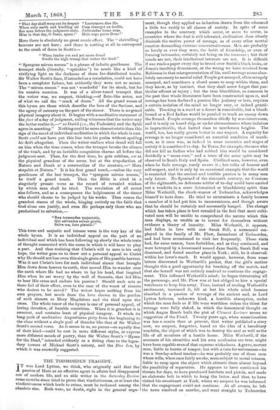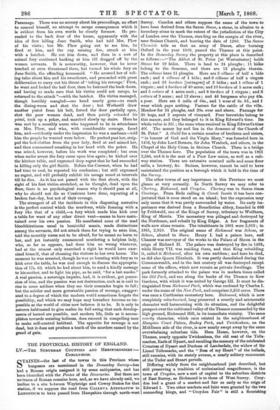THE TODMORDEN TRAGEDY.
iT was Lord Lytton, we think, who originally said that the passion of Hate as an effective agent in affairs had disappeared Out of modern life, and an able writer in the Saturday Review some months since tried to prove that vindictiveness, or at least the vindictiveness which leads to crime, must be reckoned among the obsolete sins. Both were, no doubt, right in the general argu- ment, though they applied an induction drawn from the educated a little too rashly to all classes of society. In spite of some examples to the contrary; which occur, or seem to occur, in countries where the duel is still tolerated, civilization does clearly diminish the motive power of reveng,e, as of every other mental emotion demanding extreme concentrativeness. Men are probably as lonely as ever they were, the habit of friendship, or even of forming intimacies, certainly not being on the increase ; but their minds are not, their intellectual interests are not. It is difficult if one reads a paper every day to brood over Smith's black looks, or Jones's insulting demeanour, or the wrong we have received from Robinson in that misrepresentation of his, until revenge seems abso- lutely necessary to mental relief. People get annoyed, often savagely annoyed, and sometimes a. chord seems to snap within them, and they know, as by instinct, that they shall never forget that par- ticular affront or injury ; but the true bloodthirst, so common in the past that whole literatures have been constructed upon it, and revenge has been declared a passion like jealousy or love, requires a certain isolation of the mind no longer easy, or indeed practi- cable. Tracking in a wood or a desert is conceivable, but a blood- hound or a Red Indian would be puzzled to track an enemy down the Strand. People revenge themselves chiefly by non-intercourse, and it is only on board ship, or under circumstances where isolation is impracticable, that hatred rises to murderous heights. The world, too, has really grown better in one respect. A capacity for revenge is no longer considered an essential condition of manli- ness, as it once was, as indeed in some countries and stages of society it is considered to-day. In Texas, for example, the man who did not kill an Indian who had robbed him would be considered decidedly a "mean cuss," and a trace of the same spirit may be observed in South Italy and Spain. Civilized man, however, even when he feels revenge, rarely avows it ; but talks of honour and self-respect, and it is only by an occasional example that the world is reminded that the ancient and terrible passion is in many men only latent. No Spaniard of the sixteenth century, no Corsican of the eighteenth, no Arkansas settler of to-day could have carried out a vendetta in a more determined or bloodthirsty spirit than Miles Wetherill, the check-weaver of Todmorden, acknowledges himself to have done. He tried to exterminate a family because a member of it had put him to inconvenience, and though aware that he should be certainly and necessarily hanged. The change which has taken place is best revealed in the fact that most cal*, vated men will be unable to comprehend the nature which this man displays, so unable as to invent for themselves without evidence a theory of insanity. Miles Wetherill, it appears, had fallen in love with one Sarah Bell, a nursemaid em- ployed in the family of Mr. Plow, Incumbent of Todmorden, and had been accustomed to visit her frequently. These visits had, for some reason, been forbidden, and as they continued, and were betrayed by a housemaid named Jane Smith, Sarah Bell was dismissed, and found another place in York ; still, be it observed. within her lover's reach. It would appear, however, from some letters discovered in Wetherill's pocket, that the girl's mother thought this a good opportunity for breaking off the match, and that she herself was not entirely resolved to continue the engage- ment. This inflamed Wetherill's mind ; he began threatening all the parsonage, and Mr. Plow was at last obliged to hire a special watchman to keep him away. Time, instead of cooling Wetherill's excitement, increased it, till at last his whole mind became absorbed in a passion of revenge of the ancient and, as Lord Lytton believes, unknown kind, a horrible absorption, under which the man feels as if life were worthless unless the thirst for revenge were fully slaked, in which the demoniacal thought on which Angus Reach built the plot of Clement Lorimer seems no suggestion of the Fiend. Twenty years ago, when sensationalism was less a mania than at present, that writer published a story now, we suspect, forgotten, based on the idea of a hereditary vendetta, the object of which was to destroy the soul as well as the life of all members of a hostile house. Miles Wetherill, if the accounts of his atrocities and his own confession are true, might have been capable even of that supreme wickedness. A.grave, morose man, liable to bursts of temper, but with a turn for seriousness—he was a Sunday-school teacher—he was probably one of those men whose wills, when once fairly awoke, seem subject to moral tetanus, liable to snap upon the object which attracts them almost beyond the possibility of separation. He appears to have continued his threats for days, to have purchased hatchets and pistols, and made an elaborate belt in which to hang the latter, and then to have visited his sweetheart at York, where we suspect he was informed that the engagement could not continue. At all events, he left the town resolved on murder, and went straight to Todmorden Parsonage. There was no secrecy about his proceedings, no effort to conceal himself, no attempt to escape consequences which it is evident from his own words he clearly foresaw. He pro- ceeded to the back door of the house, apparently with the idea of first killing Jane Smith, who had told Mrs. Plow of his 'visits; but Mr. Plow going out to see him, he fired at him, and the cap missing fire, struck at him with a hatchet. He cut him down, and then in a sort of animal fury continued hacking at him till dragged off by the women servants. It is noteworthy, however, that he never touched or even threatened them, but turned his whole fury on Jane Smith, the offending housemaid. "He accused her of tell- ing tales about him and his sweetheart, and proceeded with great deliberation to carry out his threat of 'taking his revenge.' First, he went and locked the hall door, then he fastened the back-doors, and having so made sure that his victim could not escape, he returned to the attack "—with the hatch3t. His victim managed, though horribly mangled—one hand nearly gone—to reach the dining-room and shut the door ; but Wetherill drew another pistol from his belt, forced the door partially open, shot the poor woman dead, and then quietly reloaded his pistol, took up a poker, and marched slowly up stairs. Here he was met by a monthly nurse who happened to be in attendance on Mrs. Plow, and who, with considerable courage, faced him, and—evidently under the impression he was a madman—told him the people he wanted were below. He pushed past her, strip- ped the bed-clothes from the poor lady, fired at and missed her, and then commenced smashing in her head with the poker. He -was seized, however, before his work was completed ; but even when under arrest the fury came upon him again ; he kicked over the kitchen table, and expressed deep regret that he had succeeded in killing only the girl Smith. Before the Coroner, when he had had time to cool, he repeated his confession ; but still expressed no regret, and will probably exhibit his savage mood at intervals till he dies. As it has not passed with the first shock, with the sight of his first victim stretched, as he thought, dead upon the floor, there is no psychological reason why it should pass at all, why he should not die as Corsicans have done, repenting of a broken fast-day, but not of their revenge.
The strangest of all the incidents in this disgusting narrative is the perfect control which the murderer, while foaming with a fury like that of a child,—a fury which made him kick over a table for want of any other direct vent—seems to have main- tained over his own passion. He manifested none of the mad bloodthirstiness usual in homicidal mania, made distinctions among the servants, did not attack them for trying to seize him, told the monthly nurse not to be afraid, for he meant no harm to her, and yet instantly commenced murdering a helpless lady, who, so far as appears, had done him no wrong whatever, had at the utmost only exercised a right he would have exer- cised himself, that of choosing the visitors to her own house. The moment he was arrested, though he was so bursting with fury as to kick over the table, he was cool enough to discuss the appropria- tion of 17s. 6d. which he had about him, to send a kindly message to his mother, and to light his pipe, as he said, "for a last smoke." A real passion, a sovereign impulse, had, it is evident, got posses- sion of him, and the passion was not destruction, such as is said to rise in some soldiers when they see their comrades begin to fall ; but the subtler and more governable passion of revenge, exagger- ated to a degree of which the modern world sometimes forgets the possibility, and which we may hope may hereafter become as im- possible as the world of cities now believes it to be. It is only in natures habituated to give malice its full swing that such develop- ments of hatred are possible, and modern life, little as it accom- plishes towards securing holiness, does succeed in compelling men to make self-control habitual. The appetite for revenge is not dead, but it does not produce a tenth of the murders caused by the greed of gain,



































 Previous page
Previous page